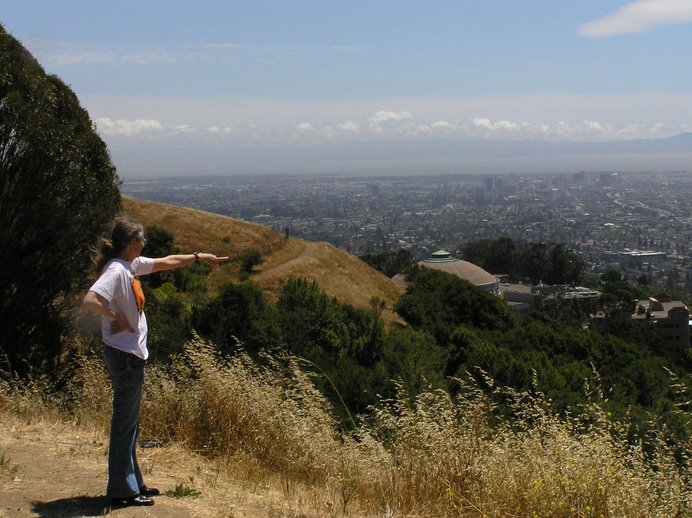



Report from Iraq # 11: Wherein 25 Iraqi journalists invade my bedroom & I meet an admiral
(Photos are of Admiral Jawad, the naval press conference at CPIC, and some sand and McMansions in Kuwait)
After getting only three hours sleep the night before because I had to take the Rhino armored bus convoy in from Camp Stryker in the middle of the night, I woke up the next morning in the Green Zone in a bunk bed in the press room at the Combined Press Information Center, tired and hungry. "Got any breakfast?" I asked the sergeant on desk duty.
"Would you like some Cocoa Puffs?" she replied. Er, no thanks. "But lunch will be ready in about an hour." So I went back to the media room where I had set up a bedroom behind a blanket hung over the top of my bunk bed, and crawled into bed to wait for said lunch. But then suddenly the entire media room began filling up with Iraqi journalists.
"There's going to be a press conference here at 2:00 pm today," said one of the reporters. "An Iraqi admiral will speak." Cool. You learn something new every day. I didn't even know that Iraq had a navy.
Then another Iraqi journalist helped me get my thumb-drive's USB port to upload my photos and we got to talking. At first I completely hogged our conversation, telling him all about my family and stuff and how my middle daughter had just e-mailed me that I was a bad mother. Huh? It's not like she's still in diapers or nothing. She's practically middle-aged herself. She needs to get over it. It's not like she needs me to be back home to be reading her bedtime stories or watching Libra get evicted from Big Brother 10.
But then it suddenly hit me. "Here I am in Iraq, sitting right next to an actual real live Iraqi journalist! This guy must have seen it all. I should be interviewing him!" So I did.
"I'm currently working on an article about the Baghdad electrical system," he told me. "In some areas of the city they only receive electricity for one hour a day." I imagine that it's hard to keep ice cream cold in the refrigerator that way -- to say nothing about running the A/C. Then we talked for a while about the problems of getting the local power stations up and running. But what I really wanted to grill this guy about was how he felt about Nouri al-Maliki, Iraq's current prime minster.
"What about Maliki?" I asked. "What can you tell me about him?"
"He pretty much has to do what the Americans tell him to do," said the journalist. "Plus there are Iraqis who he respects who come to him and ask him to do things that he doesn't want to do -- and he has to do them anyway because he respects the requesters, if not the requests." And apparently Maliki, like Karzai in Afghanistan, is more powerful in the capital than he is in the provinces.
Then I tried to take a nap before the press conference started but it was no use. "We have you signed up for the Rhino again tonight," said one of the CPIC press coordinators. Not ANOTHER night without sleep, I groaned to myself. But I was still glad that I had come to the Green Zone -- if for no other reason than to meet 25-plus Iraqi journalists, right here in my own, er, bedroom. Theirs is an extremely risky occupation and I admire them a lot. They do everything else that all the rest of us do -- plus they do it all in Arabic as well!
Then the press conference began.
"This day commemorates the 72nd anniversary of the Iraqi Navy, founded in 1937," said the moderator. Then an Iraqi admiral was introduced and a British navy dude too. The Brit was wearing tan camos. Hmmm. How come Navy camos are tan? If they were truly meant to camouflage anything out on the ocean, shouldn't they be done up in blue? Or green at the least.
"90% of the oil exported from Iraq goes through its ports, so the Navy is obviously important," said the admiral. And the British captain said that the Iraqi navy is being totally renovated and that the renovation is being financed by the nation's oil wealth. "The British are in charge of training young Iraqi naval officers." And apparently the US navy is involved in the training as well.
One journalist asked about the current state of the navy's vessels and also about its conflicts with Iranian vessels. "We have a small number of boats now," replied the admiral, "but we are planning to increase equipment and crews in phases. International companies will receive contracts for our new boats. But we must also have trained crews. As for the trespassing issue, we have had no assaults; only trespassing fishermen who are respectfully returned to their own waters."
I wish I could have asked a hot-spit question myself, but even though my father had been the head of the fleet post office in Occupied Japan after World War II and thus, theoretically, I should have salt water running through my veins, I just couldn't think of any -- except of course for the one about the navy's choice of designer colors for their camos -- so I kept my mouth shut.
"The Iraqi navy deals with smuggling and terrorism," said the British captain, "but the British navy is responsible for protecting oil interests." Did he really just say that or did I misunderstand?
Apparently the Iraqi navy recruited their crews from non-Baathists at first but now they recruit from everybody. There are 1,900 personnel now -- aiming for 2,000 by the year 2010. "But we are aiming for quality rather than numbers," said the admiral. Then the moderator told us about an Iraqi naval lieutenant who had just been presented with the prestigious "Queen's Binoculars Award" -- and that was the end of the press conference.
Now let's talk about sleep. A three-hour nap is totally priceless at this point and that's what I got this evening, before popping back on the Rhino to Camp Stryker sometime after midnight. It seems all of a sudden that three hours of sleep will keep me going for days.
While camping out in the CPIC media room, I also met an American journalist who was working for a well-known conservative magazine, and he kept arguing about the glories of capitalism and the Surge. "Hey, I like capitalism fine," I replied. "Too bad it hasn't been practiced in America for the last 40 to 60 years."
And of course he asked what I thought that we WERE practicing. "Welfare for corporations. American corporations receive all kinds of welfare. That's not very conservative, is it now? Plus according to a recent GAO report, 80% of them don't even pay taxes." If I had been home in Berkeley, I coulda whipped out my 1996 Intel clone, googled Wikipedia and hit him with the facts:
"The label of corporate welfare," says Wikipedia, "is often used to decry projects advertised as benefiting the general welfare that spend a disproportionate amount of funds on large corporations. For instance, in the United States, agricultural subsidies are usually portrayed as helping honest, hardworking independent farmers stay afloat. However, the majority of income gained from commodity support programs actually goes to large agribusiness corporations such as Archer Daniels Midland, as they own a considerably larger percentage of production. According to the Cato Institute, the U.S. federal government spent $92 billion on corporate welfare during fiscal year 2006. Recipients included Boeing, Xerox, IBM, Motorola, Dow Chemical, and General Electric."
Then me and the conservative journalist started arguing about Georgia. "Bush and them rigged the so-called Rose Revolution elections back in 2004 and Georgians were then stuck with some weird loose cannon president who loved to bait Russia."
"Did not!"
"Did so!"
But other than his Fantasyland belief that neo-cons are actually conservatives and not just crooks, the guy was really nice and we bonded a lot over having to endure the Rhino ordeal-by-sleep-deprivation together, arriving back at Camp Stryker by 2:00 am. By 3:00 am, I was busy plotting how to get out to the Baghdad airport and get on Space-A for a C-130 flight to Kuwait. Then I would have 24 hours at the US airbase there in order to do laundry and get bug-bite medication before taking a bus to KWI and flying to Frankfurt the following night.
In the meantime, I kept complaining about my bug bites. "Oh, I bet you have Leishmaniasis," said the conservative journalist.
"What's that?"
"It's a disease spread by sand flies. You'd better get it treated over here because no one back in the states knows how to deal with it so you will end up itching for the rest of your life." Now there's a grim thought.
The conservative journalist also told me that he had been to Haifa Street in 2003 and 2004. "It's really different here now. The whole way soldiers operate is different." Yeah. That's my point too. Now they use carrots instead of sticks. Carrots work better. Too bad Rumsfeld and Brenner didn't figure that one out back in 2003. We could have saved hundreds of billions of dollars, approximately a million lives and a whole bunch of grief.
"But you can't say that the Surge isn't working!" said the conservative journalist. So I won't. But mostly what is happening here in Iraq today seems to be the result of the Iraqis themselves saying, "Enough killing!" Or maybe it was because I came over here back in 2007 and gave them all a good talking to. Could be. I gots the motherly touch, even despite what my middle daughter thinks.
But the way I see it about the Surge is that it did help somewhat -- but the bottom line is that 30,000 more US soldiers aren't going to make that big of a difference in a country full of 25 million Iraqis if said Iraqis don't want a difference to be made -- and if the US militray's policies hadn't changed. And even I have to give General Petraeus snaps for that. He took our policies here out of the Washington salons -- where it is all too easy to just give orders to drop more and more bombs -- and started working the streets instead.
It's 5:00 am now (again). Everyone else in the entire world is asleep. Where the freak is my bus to the airport!

